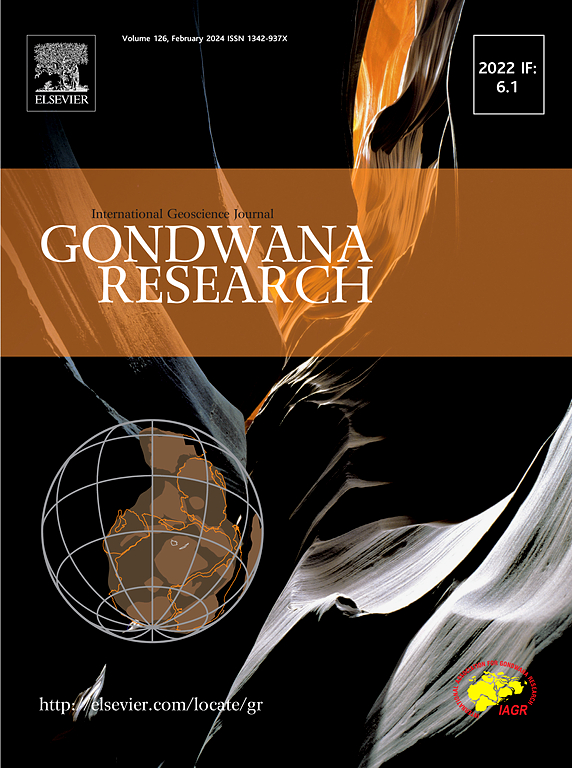冈瓦纳西南部的三叠纪岩浆活动:退缩边缘的弧熔岩构造实例
IF 7.2
1区 地球科学
Q1 GEOSCIENCES, MULTIDISCIPLINARY
引用次数: 0
摘要
chollay_piuquenes岩基(CPB)代表了冈瓦纳西缘大量的中-下三叠世岩浆活动。它出现在智利额科迪勒拉(28°30 - 30°30’s),覆盖约2,400平方公里。其岩浆产率为6 ~ 7.5 km3/Myr km−1,由位于16 Myr区间的Chollay和Piuquenes深部杂岩组成。岩基岩性从闪长岩到正长花岗岩不等,以二长花岗岩和花岗闪长岩为主。它以前被解释为一种造山作用,碰撞后的岩浆作用,起源于裂谷大陆边缘(前安第斯旋回)的地壳熔融作用。该野外和地球化学研究表明,CPB可能是一个与俯冲有关的基底,形成于会聚退缩边缘。这一解释与冈瓦纳西部三叠纪大地构造背景一致。此外,从弧前和弧后盆地的同期发育以及表明中生代地壳沿边缘减薄的地球化学信号推断出CPB侵位的伸展背景。CPB岩石表现出亚碱性、偏铝质到过铝质、钙碱性到碱钙亲和关系,LILE相对于HFSE富集,Nb-Ta、Ti、Sr和P富集,Pb富集。岩石显示出平坦的REE模式(LaN/YbN: 3.40 ~ 13.78), Al-in-Hbl气压计(1.7 ~ 1.8±0.6 kbar)表明其为水平位进。Sr-Nd-Pb同位素特征表明,岩浆的主要生成过程是地幔和大陆地壳的混合作用,而不仅仅是地壳的改造作用。将CPB样品与其他已知的后退和前进边缘岩基进行比较分析,可以建立区分每种构造背景的标准。本文章由计算机程序翻译,如有差异,请以英文原文为准。

The Triassic magmatism in southwestern Gondwana: An example of arc batholith construction in a retreating margin
The Chollay-Piuquenes batholith (CPB) represents voluminous Lower-Middle Triassic magmatism on the western margin of Gondwana. It crops out in the Chilean Frontal Cordillera (28°30′S–30°30′S), covering ∼2,400 km2. It is composed of the Chollay and Piuquenes plutonic complexes, that were emplaced over a 16 Myr interval, with magma production rates ranging from 6 to 7.5 km3/Myr km−1. The batholith lithologies vary from diorites to syenogranites, with a predominance of monzogranites and granodiorites. It was previously interpreted as an anorogenic, post-collisional magmatism, originated from crustal anatexis in a rifting continental margin (Pre-Andean Cycle). This field and geochemical study proposes that CPB is likely a subduction-related batholith constructed in a convergent retreating margin. This interpretation is consistent with the Triassic geotectonic context proposed for western Gondwana. Moreover, the extensional context for the CPB emplacement is inferred from the contemporaneous development of forearc and back-arc basins, and from geochemical signals indicating Mesozoic crustal thinning along the margin. The CPB rocks exhibit subalkaline, meta- to peraluminous, calc-alkaline to alkaline-calcic affinities, enrichment in LILE relative to HFSE, depletion in Nb-Ta, Ti, Sr, and P, and Pb enrichment. The rocks display flat REE patterns (LaN/YbN: 3.40–13.78) and Al-in-Hbl barometer calculations (1.7–1.8 ± 0.6 kbar) suggest an epizonal emplacement. The Sr-Nd-Pb isotopic signature suggests a mixture of depleted mantle and continental crust, and not only crustal reworking, as the main magma-generating process. A comparative analysis of CPB samples with other well-known examples of both retreating and advancing margin batholiths allows the establishment of criteria to distinguish each tectonic context.
求助全文
通过发布文献求助,成功后即可免费获取论文全文。
去求助
来源期刊

Gondwana Research
地学-地球科学综合
CiteScore
12.90
自引率
6.60%
发文量
298
审稿时长
65 days
期刊介绍:
Gondwana Research (GR) is an International Journal aimed to promote high quality research publications on all topics related to solid Earth, particularly with reference to the origin and evolution of continents, continental assemblies and their resources. GR is an "all earth science" journal with no restrictions on geological time, terrane or theme and covers a wide spectrum of topics in geosciences such as geology, geomorphology, palaeontology, structure, petrology, geochemistry, stable isotopes, geochronology, economic geology, exploration geology, engineering geology, geophysics, and environmental geology among other themes, and provides an appropriate forum to integrate studies from different disciplines and different terrains. In addition to regular articles and thematic issues, the journal invites high profile state-of-the-art reviews on thrust area topics for its column, ''GR FOCUS''. Focus articles include short biographies and photographs of the authors. Short articles (within ten printed pages) for rapid publication reporting important discoveries or innovative models of global interest will be considered under the category ''GR LETTERS''.
 求助内容:
求助内容: 应助结果提醒方式:
应助结果提醒方式:


